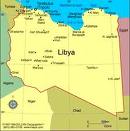Libya: US Blocks Russian UN Resolution of Bani Walid Violence

The United States has blocked a draft statement, proposed by Russia, on the resolution of violence in the Libyan town of Bani Walid, which has been under siege for weeks. The statement called for a peaceful solution to the conflict.
Russia’s envoy to the UN, Vitaly Churkin said the move “can’t be serious,” reminding the American delegation of the deadly attack in Benghazi that claimed the lives of four US diplomats in September.
“Blocking a draft statement that called to solve the country’s political problems without violence is very strange,” Churkin said. “This is a case when it is difficult to explain the US delegation’s actions in rational terms.”
The statement drafted by Russia on Bani Walid called on the Libyan authorities “to take urgent steps to resolve the conflict by peaceful means and to preserve the rights of all Libyan citizens.” It also expressed concern about the significant escalation of violence in and around the city of Bani Walid in recent days.
Lawrence Freeman, from news magazine Executive Intelligence Review says the US will block any peaceful solution to the ongoing violence in Libya, because stability in the region is not in its interests.
“The ambassador from Russia made a perfectly reasonable proposal to quiet down the violence,” he said. “And he would expect that the United States, as a super power, would respond in a rational manner. The problem is that President Obama and his UN envoy Susan Rice – they are not interested in developing peace in Libya and in the whole Middle East area. And therefore they are going to torpedo any moves that the Russians make that would tend to quiet the situation down.”
Reports from the small town indicate innocent civilians are becoming the victims of fighting between pro-government forces and Gaddafi loyalists.
The latest round of fighting was provoked by the death of Omran Shaaban, the rebel from Misrata credited with capturing Muammar Gaddafi, who was hiding in a drain pipe in Sirte on October 20, 2011. He died on September 25 after two months’ detention in Bani Walid.
Pro-government forces and militias besieged the town in order to find those responsible for the death of “the hero of a new Libya,” as Shaaban was dubbed.
Bani Walid commanders accuse pro-government troops and militias of “shelling the town with long-range weapons and even targeting the hospital.”
A local resident currently residing in Italy, but whose family remains in the town, told RT the current shelling of the town is Misrata militias’ attempt to “eliminate” it. He claims that initially the government called for an end to the violence, but later came up with a call to “clean Bani Walid.”
The UN Security Council has also discussed a possible meeting with envoy to Libya Tarek Mitri, Churkin said. But it remains unclear when he will be able to speak, even via video link.
Earlier on Tuesday, the Security Council also postponed the adoption of another two draft statements proposed by Russia. The first condemned a terrorist attack in Damascus on October 21 which caused numerous civilian deaths and injuries. The second called on both the government and the rebels to agree to a ceasefire during the Muslim holiday of Eid Al Adha, to allow the people to observe it in peace and security. Eid Al Adha starts on October 25 and lasts for three days.
Russia’s call for a ceasefire coincides with similar efforts by international peace envoy Lakhdar Brahimi to persuade Syrians to agree to a ceasefire during the holiday.
Brahimi left Syria on Tuesday, after finishing a four-day visit aimed at getting support for his proposal for an end to violence there.

